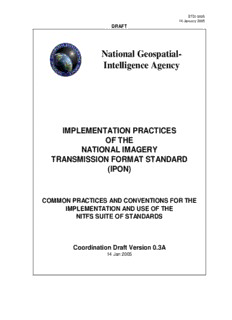Table Of ContentSTDI-0005
14 January 2005
DRAFT
National Geospatial-
Intelligence Agency
IMPLEMENTATION PRACTICES
OF THE
NATIONAL IMAGERY
TRANSMISSION FORMAT STANDARD
(IPON)
COMMON PRACTICES AND CONVENTIONS FOR THE
IMPLEMENTATION AND USE OF THE
NITFS SUITE OF STANDARDS
Coordination Draft Version 0.3A
14 Jan 2005
STDI-0005
14 January 2005
DRAFT
STDI-0005
14 January 2005
DRAFT
TBD/TBR Listing
Page Number TBD/TBR Description
B-1 TBD001 B.1.3 Background
F-1 TBD003 NITF to JPEG, SunRaster, TIFF, GeoTIFF
F-1 TBD004 JPEG, SunRaster, TIFF, GeoTIFF to NITF
F-1 TBD005 Feature Conversions within NITF Image Segments
K-1 TBD006 Appendix K
M-1 TBD008 Archetype
Q-1 TBD009 Appendix Q – Product Summaries & Archetypes for Tactical
Products
i
STDI-0005
14 January 2005
DRAFT
Change Log
Date Pages Affected Mechanism
21 June 2001 All Draft Version 0.1, Initial Release
24 January 2003 All Draft version 0.2
1 December 2003 All Draft version 0.3
All Coordination Draft Version 0.3A
ii
STDI-0005
14 January 2005
DRAFT
Effectivity Log
Number Effective Description
iii
STDI-0005
14 January 2005
DRAFT
(This page intentionally left blank.)
iv
STDI-0005
14 January 2005
DRAFT
FOREWORD
The National Imagery Transmission Format Standard (NITFS) is the standard
for the formatting and exchange of digital imagery and imagery-related products
between members of the Intelligence Community. The Intelligence Community is
made up of the Department of Defense (DOD) and other departments or agencies of
the United States Government as defined by Executive Order 12333.
Members of the NITFS Technical Board (NTB) compiled these practices as
an aid to those involved with the implementation and use of the NITFS. The content
is based upon common practices, procedures, and guidelines used in fielded
systems that have successfully implemented the NITFS. To meet a wide range and
variety of imagery-related functional requirements, the NITFS has many
combinations of implementation options to select from. Those implementing the
NITFS should select and apply common practices to meet operational requirements
whenever practicable.
The DOD and members of the Intelligence and Geospatial Community are
committed to interoperability of systems used for formatting, transmitting, receiving,
exchanging, and processing imagery and imagery-related information. These
practices describe the application of the NITFS suite of standards in support of
interoperability among systems within the National Systems for Geospatial
Intelligence (NSGI), systems that interface with the NSGI, and commercial systems
that implement the NITFS.
The suite of standards that comprise the NITFS has evolved over time to
meet the requirements of user systems. These practices address implementation
topics for the NITFS associated with NITF version 1.1, NITF version 2.0, and NITF
version 2.1. Many of these practices are also suitable for use with Standardization
Agreement (STANAG) 4545, North Atlantic Treaty Organisation (NATO) Secondary
Imagery Format (NSIF). Both NITF version 2.1 and NSIF version 1.0 are now
documented in the NSIF01.00 Profile of ISO/IEC 12087-5, Basic Image Interchange
Format (BIIF).
Beneficial comments (recommendations, additions, and/or deletions) and
other pertinent data which may be of use in improving this document should be
addressed to Joint Interoperability Test Command, ATTN: NITFS Test Facility,
2001 Brainard Road, Fort Huachuca, AZ 85613-7051.
v
STDI-0005
14 January 2005
DRAFT
(This page intentionally left blank.)
vi
STDI-0005
14 January 2005
DRAFT
Table Of Contents
FOREWORD..............................................................................................................v
EXECUTIVE SUMMARY...........................................................................................xi
1 INTRODUCTION....................................................................................................1
1.1 Purpose...........................................................................................................1
1.2 Scope..............................................................................................................1
1.3 Background.....................................................................................................3
1.4 References......................................................................................................4
1.5 Applicability...................................................................................................11
1.6 Authority........................................................................................................11
1.7 Definitions......................................................................................................12
1.8 Test Program Concept ..................................................................................16
1.9 NITFS Implementation and Use Policies.......................................................17
1.10 Points of Contact.........................................................................................18
2 GENERAL NITFS IMPLEMENTATION COMPLIANCE.......................................20
2.1 General..........................................................................................................21
2.2 NITFS Complexity Levels (CLEVELs)...........................................................22
2.3 Elements of NITFS Compliance....................................................................22
2.4 NITFS Compliance Basic Functional Requirements.....................................28
2.5 NITF 2.0 Criteria............................................................................................35
2.6 NITF 1.1 Compliance Criteria........................................................................38
2.7 Date Handling Compliance Criteria:.............................................................40
2.8 Use of CLEVEL 99: ........................................................................................40
3 COMMON NITFS IMPLEMENTATION PRACTICES & GUIDELINES ................44
3.1 General..........................................................................................................45
3.2 Originating Station Identification (OSTAID)..................................................45
3.3 Product Identification and File Naming..........................................................46
3.4 Date and Time Fields....................................................................................46
vii
STDI-0005
14 January 2005
DRAFT
3.5 Security Fields...............................................................................................47
3.6 File Background Color (FBKGC)...................................................................51
3.7 Originator's Name and Phone Number (ONAME, OPHONE).......................53
3.8 Image Representation....................................................................................53
3.9 Image Category and Product Discovery Attributes........................................54
3.10 ICORDS/IGEOLO........................................................................................54
3.11 Image and Data Compression.....................................................................59
3.12 Reduced Resolutions...................................................................................60
3.13 Image Data Mask Tables.............................................................................61
3.14 NITFS Common Coordinate System (CCS).................................................63
3.15 Image, Graphic/Symbol, and Text Overlays................................................63
3.16 Text Segments.............................................................................................63
3.17 Tagged Record Extensions..........................................................................67
3.18 Data Extension Segments............................................................................67
3.19 NITFS Usability............................................................................................68
4 ARCHITECTURE-RELATED NITFS IMPLEMENTATION GUIDELINES............71
4.1 General..........................................................................................................71
4.2 Product Summaries and Archetypes..............................................................71
4.3 Source Production Systems...........................................................................71
4.4 Exploitation Applications................................................................................75
4.5 Archive and Dissemination Applications........................................................79
4.6 Management Applications..............................................................................79
4.7 Commercial Imagery Providers......................................................................80
4.8 Specialized Applications and Code Libraries................................................81
viii
Description:for the formatting and exchange of digital imagery and imagery-related products between members Imagery Exploitation Support System (IESS) . be made to the National Geospatial-Intelligence Agency, Attn.: NGA/T/GIS, MS-P-.

